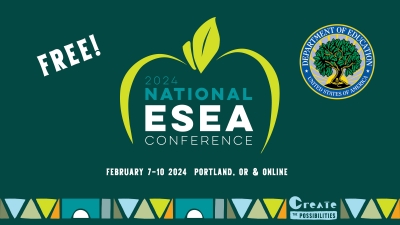
Danielle Smith is the Technical Assistance Team Lead for the U.S. Department of Education Office of State Support and leads the Equitable Access to Excellent Educators initiative and Equitable Access Support Network technical assistance support to States for implementing equity plans.
Patrick Carr is the Rural Education Achievement Program (REAP) group leader for the Office of Elementary and Secondary Education (OESE) at the U.S. Department of Education (ED). In this role he manages the Small, Rural School Achievement and Rural Low-Income School programs for the Rural, Insular, and Native Achievement program office.
Patrick Rooney is the Director of School Support and Accountability. He oversees several key components of the Elementary and Secondary Education Act of 1965 (ESEA), including 21st Century Community Learning Centers; Title I, Part A; Title I, Part D; Title II; Title III; State Assessment Grants; Competitive Grants for State Assessments; McKinney-Vento Homeless Education; Well-Rounded Education through Student-Centered Funding; and 21st Century Community Learning Centers Out of School Time Career Pathway programs. Together, these programs award more than $20 billion annually to states and districts. Prior to this, Patrick was the Deputy Director in the Office of State Support from 2014 to 2018, where he oversaw many of these same programs. Patrick previously helped lead the work of the Reform Support Network, providing technical assistance to states implementing comprehensive Race to the Top reforms, and the Race to the Top Assessment program, which provided grants to groups of states to develop new assessments aligned to state’s college and career ready standards. Patrick also worked in the Office of Elementary and Secondary Education supporting states implement their accountability and assessment systems. Patrick previously worked in the DC Office of State Superintendent of Education, where he was a senior policy advisor and worked on a variety of K-12 issues in the District of Columbia. He started his career as a statistician in the National Center for Education Statistics, analyzing education trends for a variety of topics in the Congressionally mandated annual report, The Condition of Education.
Katherine Neas serves as the acting assistant secretary in the Office of Special Education and Rehabilitative Services, at the U.S. Department of Education (Department). In this capacity, she serves as advisor to the U.S. secretary of education on matters related to the education of children and youth with disabilities, as well as employment and community living for youth and adults with disabilities. The mission of her office is to improve early childhood, educational, and employment outcomes, and to raise expectations for all people with disabilities, their families, their communities, and the nation. Neas previously served as senior vice president of public affairs at the American Physical Therapy Association (APTA). In this role, she oversaw APTA’s federal and state government public policy activities, federal regulatory affairs, grassroots and political action efforts, public relations along with payment and practice management activities. Prior to joining APTA, Neas spent 23 years at Easterseals, a national nonprofit provider of direct services to children and adults with disabilities and their families. Her roles at Easterseals included service on the senior management team, federal and state government relations advocacy, oversight of federal grants and contracts and management of the Easterseals Office of Public Affairs. Prior to Easterseals, Neas was the associate director of the American Association of University Affiliated Programs for persons with Developmental Disabilities. She also was legislative staff to Chairman Sen. Tom Harkin (D.-Iowa) of the Senate Subcommittee on Disability Policy between 1987 and 1991, where she worked on all disability legislation, including the Americans with Disabilities Act (ADA) and the Individuals with Disabilities Education Act (IDEA). A graduate of Georgetown University, she hails from Des Moines, Iowa.
Todd Stephenson is a Management and Program Analyst in the Office of Elementary and Secondary Education, School Support and Accountability. In this capacity, he works with different aspects of the Title I, Part A program and other ESEA programs, including allocations, use of funds, and equitable services.
Ruth Ryder is the Deputy Assistant Secretary for the Office of Policy and Programs – Formula Grants in the Office of Elementary and Secondary Education (OESE) at the U.S. Department of Education. In this role, Ms. Ryder oversees a broad range of management, policy, and program functions related to formula and discretionary grant programs under the Elementary and Secondary Education Act, as amended by the Every Student Succeeds Act (ESEA). Ms. Ryder was previously the deputy director of the Office of Special Education Programs in the Office of Special Education and Rehabilitative Services, which she joined in 1988. Prior to joining the Department, Ms. Ryder was a program administrator in a Washington state school district. There she had responsibility for the Elementary and Secondary Education Act Title 1 and Title II programs, state-remediation, gifted education, outcome-based education, and state- and district-wide testing programs. Ms. Ryder has a bachelor’s degree in psychology and elementary education and a master’s degree in special education.








